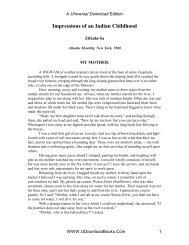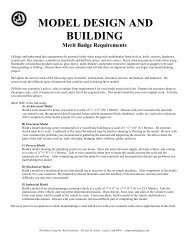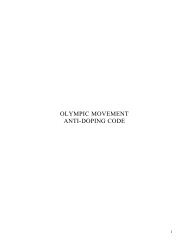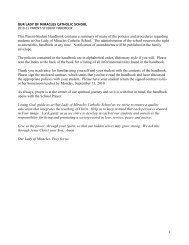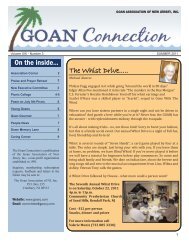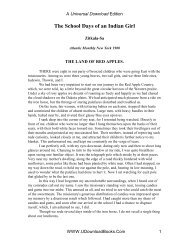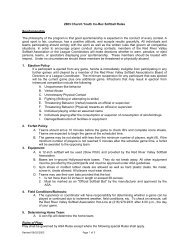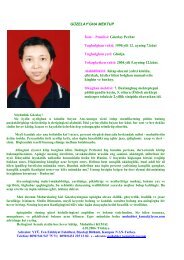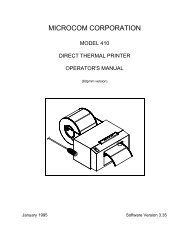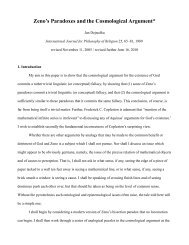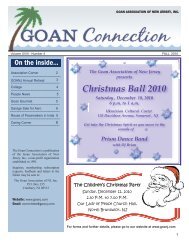Dummett's Backward Road to Frege and to Intuitionism - Tripod
Dummett's Backward Road to Frege and to Intuitionism - Tripod
Dummett's Backward Road to Frege and to Intuitionism - Tripod
You also want an ePaper? Increase the reach of your titles
YUMPU automatically turns print PDFs into web optimized ePapers that Google loves.
same extensional in sense (2) mapping function. Our world of four objects logically could be the actual<br />
world. Thus even if logical equivalence were <strong>Frege</strong>’s criterion for the identity of thoughts, the problem<br />
of sensial underdetermination would remain for indefinitely many logically contingent statements in an<br />
ideal scientific language (compare Dummett 1981: 228, 636).<br />
But I reject the suggestion, <strong>and</strong> I accept Dummett’s view that sensial identity is given. Perhaps<br />
all analytic truths have the same general truth-condition, true under any condition. But even if<br />
necessary truth is the same as purely general truth for <strong>Frege</strong>, the specific or proper truth-conditions of<br />
“2 + 2 = 4” <strong>and</strong> “(x)(x = x)” are different, consisting of different specific functions <strong>and</strong> objects in<br />
different specific relationships. Strictly, even “2 + 2 = 4” <strong>and</strong> “4 – 2 = 2” have different truth-<br />
conditions <strong>and</strong> express different thoughts. As <strong>to</strong> sensial identity, <strong>Frege</strong>’s plea that we must allow<br />
transformations of the same thought in logical inference can be substantially preserved by glossing<br />
transformations as changes <strong>to</strong> new thoughts which are substantially the same <strong>and</strong> differ only<br />
holistically in their slicing. But on pain of vicious cognitive regress, it is essential that all senses<br />
logically can be directly given, no matter how indirect the sense. Dummett is absolutely right that given<br />
sensial identity is fundamental <strong>and</strong> trumps transformations (1981: 631–37). But then even sameness of<br />
truth-condition does not imply sameness of sense, since <strong>Frege</strong>’s specific truth-conditions are<br />
extensional in sense (2), exactly like the cus<strong>to</strong>mary references they consist of, while his given senses<br />
are intensional in sense (2). This is why <strong>Frege</strong> would reject even C. I. Lewis’s definition of a<br />
predicate’s intension as (in effect) the class of all possible objects satisfying it (Lewis 1946: 39). For<br />
on that definition, the senses of “= (1 + 1)” <strong>and</strong> “= (4 – 2)” are the same.<br />
The actual world is only the actual set of compossible truth-conditions. But even if we knew all<br />
possible truth-conditions as composed of all possible cus<strong>to</strong>mary references in all possible worlds, why<br />
assume that the problem of sensial underdetermination would somehow magically vanish? Even if <strong>to</strong><br />
give all possible cus<strong>to</strong>mary references is <strong>to</strong> give all their possible modes of presentation via each other<br />
20




